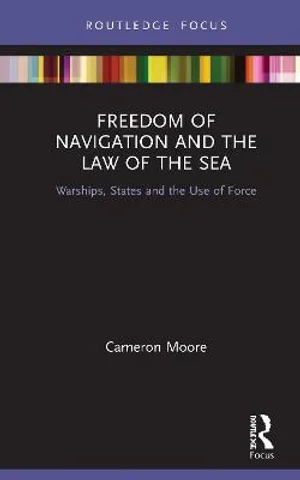
Freedom of Navigation and the Law of the Sea. By Cameron Moore. Routledge, London and New York, 2021.
Reviewed by Tim Coyle
Freedom of Navigation (FoN) and Law of the Sea (LoS) are at the forefront of strategic manoeuvring, particularly in the South China and East China Seas, caused by China’s maritime claims and bolstered by aggressive state maritime instrumentalities such as the People’s Liberation Army-Navy, the China Coast Guard and the People’s Maritime Militia. China has been using naval and para-naval power increasingly over the past 10 to 15 years to establish regional maritime and air dominance over neighbouring claimant states and in challenging the ‘rules-based order’ supported by the US and Allies.
Apart from the current and recent past instances of Chinese maritime challenges, FoN and LoS contingencies have figured prominently through threatened and actual blockages in the Straits of Hormuz and the Black and Baltic Seas raising points of potential conflict.
The author of Freedom of Navigation and the Law of the Sea is Dr Cameron Moore, Deputy Head of the University of New England School of Law and naval reservist. Moore’s intent in writing the book is to clarify the rules of FoN and LoS to reduce the risk of miscalculation and provide a context for discussion at the political/military strategic and operational levels. To achieve this aim Moore addresses his topic in six chapters.
Chapter One, General Principles on the Use of Force and their Applications at Sea, is highly topical but quite contested. The Chapter discusses the UN Charter and related international law and cases. Chapter Two, covers Unit and Collective Self-Defence, distinguishing these from national self-defence. Chapter Three assesses Proportionality and the Threshold of Armed Conflict while Chapter Four, Territorial and Internal Waters, addresses the use of force in maritime zones under the LoS. Chapter Five, Straits and Archipelagos deals with navigation in these areas quoting case law guidance and Chapter Six, International Waters, concerns the legal regimes for high seas Economic Exclusion Zones and contiguous seas.
Moore posits that the law cannot provide solutions to all contingencies involving warships, FoN and the use of force; however, he offers this book as a set of rules respecting coastal states’ sovereignty protection and for the lawful navigation of warships while observing the rights of all sides. Moore identifies 25 rules for the interaction of warships and coastal states below the threshold of war for the guidance of government and military authorities. However, while the law alone cannot prevent conflict a lack of clarity in established law, coupled with opposing states’ unilateral maritime demands, can give rise to potential conflict.
This book is part of the Routledge Research on the Law of the Sea, associated titles of which are: The International Court of Justice in Maritime Disputes, Freedom of Navigation in the Asia-Pacific Region and Maritime Claims and Boundary Delimitation.
Moore’s analysis concludes with a summary of the 25 rules; complications in interpreting these rules in an operational context may include ‘grey zone’ confrontations between warships and state coast guards, supplemented by maritime police or militias ostensibly operating as fishing vessels. Air operations, either by manned or unmanned aircraft launched from warships or land-based, conducting overflights in contested regions may also figure in engagements with naval and para-naval platforms and with opposing aircraft.
While international in scope, the principles and rules advocated may, or may not, be shared by authorities in countries and military forces with which Australia is associated through alliances or partnerships, either on the macro-strategic level or for limited operational cooperation. Consequently, unilateral Australian adherence to these principles, in some instances, might be at variance to otherwise cooperating forces.
By its nature, Freedom of Navigation and the Law of the Sea belongs in the reference libraries of strategic analysts and legal specialists, in the syllabuses of War and Staff colleges with the principles promulgated to maritime and air operational commands.


